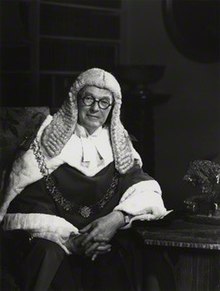Hubert Parker, Baron Parker of Waddington
|
The Right Honourable The Lord Parker of Wadington PC |
|
|---|---|

1968 photograph, by Godfrey Argent
|
|
| 10th Lord Chief Justice of England and Wales | |
|
In office 29 September 1958 – 20 April 1971 |
|
| Nominated by | Harold Macmillan |
| Appointed by | Queen Elizabeth II |
| Preceded by | The Lord Goddard |
| Succeeded by | The Lord Widgery |
| Judge of the Court of Appeal | |
|
In office 1954–1958 |
|
| Appointed by | Queen Elizabeth II |
| Judge of the High Court of Justice | |
|
In office 1950 – 20 April 1971 |
|
| Appointed by | Queen Elizabeth II |
| Personal details | |
| Born |
Hubert Lister Parker May 28, 1900 |
| Died | September 15, 1972 (aged 72) |
| Nationality | British |
| Parents | Robert Parker, Baron Parker of Waddington |
| Education | Rugby School |
| Alma mater | Trinity College, Cambridge |
| Awards |
Knight Bachelor Life peer |
Hubert Lister Parker, Baron Parker of Waddington, PC (28 May 1900 - 15 September 1972) was a British judge who served as Lord Chief Justice of England from 1958 to 1971. His term was marked by much less controversy than under his predecessor, Lord Goddard.
Parker was the son of Robert Parker, Baron Parker of Waddington, who had been a Lord of Appeal in Ordinary. He went to Rugby School (which he enjoyed; in later years he was Chairman of the Governors) and Trinity College, Cambridge. He graduated with a double first in Natural Sciences, specialising in geology and intending to go into the oil business. This intention he abandoned on graduating in 1922 to read for the Bar (Lincoln's Inn) where he was called in 1924, entering the chambers of Donald Somervell.
At the Bar, Parker specialised in commercial cases and developed a courtroom style that tried to be fair to all the arguments and make a case with calmness. In 1945, he became the Junior Counsel to the Treasury (Common Law) (also referred to as the "Treasury devil"), an appointment which normally led on to promotion to the High Court bench; however, when the invitation camre from Lord Jowitt in 1948, Parker thought it was too soon and that he had only just become useful to the Treasury Counsel, and therefore declined. He accepted the second invitation when it came in 1950. As he went straight from being Treasury Devil to the High Court, he never 'took silk' (that is to say, he was not a King's Counsel): the Treasury Devil is never a 'silk'.
...
Wikipedia
